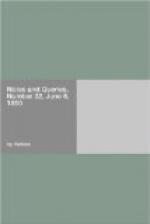“After that thies Newes
afforesaide ware dyvulgate in the
Citie here.”
Dated from Rome, September, 1513.
The Newes was of the victory just gained by Henry over the French, commonly known as “The Battle of the Spurs.”
A.E.B.
* * * * *
THE DODO QUERIES.
I beg to thank Mr. S.W. Singer for the further notices he has given (Vol. i., p. 485.) in connection with this subject. I was well acquainted with the passage which he quotes from Osorio, a passage which some writers have very inconsiderately connected with the Dodo history. In reply to Mr. Singer’s Queries, I need only make the following extract from the Dodo and its Kindred, p. 8.:—
“The statement that Vasco de Gama, in 1497, discovered, sixty leagues beyond the Cape of Good Hope, a bay called after San Blaz, near an island full of birds with wings like bats, which the sailors called solitaries (De Blainville, Nouv. Ann. Mus. Hist. Nat., and Penny Cyclopaedia, DODO, p. 47.), is wholly irrelevant. The birds are evidently penguins, and their wings were compared to those of bats, from being without developed feathers. De Gama never went near Mauritius, but hugged the African coast as far as Melinda, and then crossed to India, returning by the same route. This small island inhabited by penguins, near the Cape of Good Hope, has been gratuitously confounded with Mauritius. Dr. Hamel, in a memoir in the Bulletin de la Classe Physico-Mathematique de l’Academie de St. Petersbourg, vol. iv. p. 53., has devoted an unnecessary amount of erudition to the refutation of this obvious mistake. He shows that the name solitaires, as applied to penguins by De Gama’s companions, [I should have said, ‘by later compilers,’] is corrupted from sotilicairos, which appears to be a Hottentot word.”
I may add, that Dr. Hamel shows Osorio’s statement to be taken from Castanheda, who is the earliest authority for the account of De Gama’s voyage.
H.E. STRICKLAND.
* * * * *
BOHN’S EDITION OF MILTON.
Mr. Editor,—I have just seen an article in your “NOTES AND QUERIES” referring to my edition of Milton’s prose works. It is stated that, in my latest catalogue, the book is announced as complete in 3 vols., although the contrary appears to be the case, judging by the way in which the third volume ends, the absence of an index, &c.
In reply, I beg to say that the insertion of the word “complete,” in some of my catalogues, has taken place without my privity, and is now expunged. The fourth volume has long been in preparation, but the time of its appearance depends on the health and leisure of a prelate, whose name I have no right to announce. Those gentlemen who have taken the trouble to make direct inquiries on the subject, have always, I believe, received an explicit answer.




